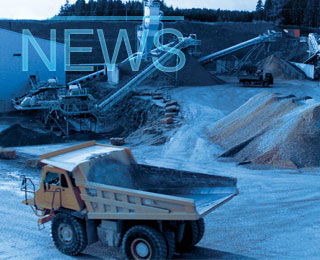The focus of a potential merger in South Africa between two major cement producers caught the eye this week. PPC and AfriSam already have a significant stake in the country’s cement market and by merging PPC would extend its dominance to control some 60 per cent of domestic sales, if it accepts AfriSam's offer to merge.
As recently as November, PPC’s chief executive, Darryll Castle, suggested that there were too many cement companies operating in the country and that consolidation was required. In 2014 PPC attempted to merge with AfriSam, but PPC’s share price was under too much pressure at the time and talks ended in March 2015. Now PPC has returned to the negotiating table with an improved gearing level and a cash flow supported by a ZAR1bn (US$76.36m) inflow from the company's first empowerment transaction.
The talks for merger between PPC and AfriSam have been gaining favour again, ever since the Public Investment Corporation (PIC) increased its investment to 15.165 per cent in PPC in May 2015. In October 2016 PIC was said to own 65.99 per cent of the share in AfriSam, having invested in the producer since 2008. PPC also saw its shares drop on the stock exchange in the autumn and board disagreements, as well as the shelving of the joint venture project in Algeria with Hodna Algerian Cement have been well documented.
The domestic market has been under pressure, too. For the nine-month period to December 2016, PPC recorded cement sales volumes that were up four per cent in South Africa, but the average selling price dipped by four per cent. Moreover, following price rises in Gauteng and inland regions in October 2016, the company witnessed high single-digit declines in cement sales volumes for the 4Q16, compared to 4Q15. A further price increase in selected South Africa regions from 1 February 2017 may see further pressure on cement sales for the company.
South African cement capacity was estimated to be at 17Mta at the end of 2016, according to PPC. Of this market PPC accounts for 7Mta of production capacity. PPC operates five integrated plants and two grinding plants in South Africa. The company is currently investing some ZAR1.7bn in the expansion of the Slurry plant with a new 1Mta SK9 line with a six-stage preheater and fourth-generation cooler technology that will be commissioned in 2018.
AfriSam may require the merger more than PPC as it has seen its cement sales dip and it has been funded by PIC to cover its debts. AfriSam has a domestic cement capacity of 3.9Mta and operates two integrated plants at Dudfield and Ulco, plus a grinding plant at Roodepoort and a cementitious milling and blending plant in Coenga. The AfriSam group has been progressively building up its expertise in cementitious cements to win new end customers.
Market intensity increases
Cement demand in the country is at approximately 13.8Mta and consumption is growing at about 3.2 per cent YoY, reports Dangote Cement South Africa (formerly Sephaku Cement Pty Ltd).
The market has been growing with the existing producers of PPC, AfriSam, LafargeHolcim and NPC Cimpor being joined by Dangote Cement South Africa and Mamba Cement, also known as Continental Cement (Conticem – Jidong Cement Group).
While Dangote Cement South Africa company has already increased competition for PPC with the Delmas grinding plant, located not far from the principal centres of Pretoria and Johannesburg, as well as its integrated factory in Aganang, PPC is in a strong position as market leader.
Mamba Cement started operating its 1Mta plant in Limpopo in January 2016 and is manufacturing its Champion cement, aiming mainly at the bulk cement market.
Regional presence will also be strengthened by PPC and AfriSam merger
PPC is a multinational producer that has further production facilities in Democratic Republic of Congo, Ethiopia, Botswana, Rwanda, Ethiopia and Zimbabwe. AfriSam is also a regional player with cement production facilities in South Africa, Botswana, Lesotho, Namibia and Swaziland.

Cement prices recovering in China
Cement prices in China are rebounding strongly as producers seek to improve profitability follow...